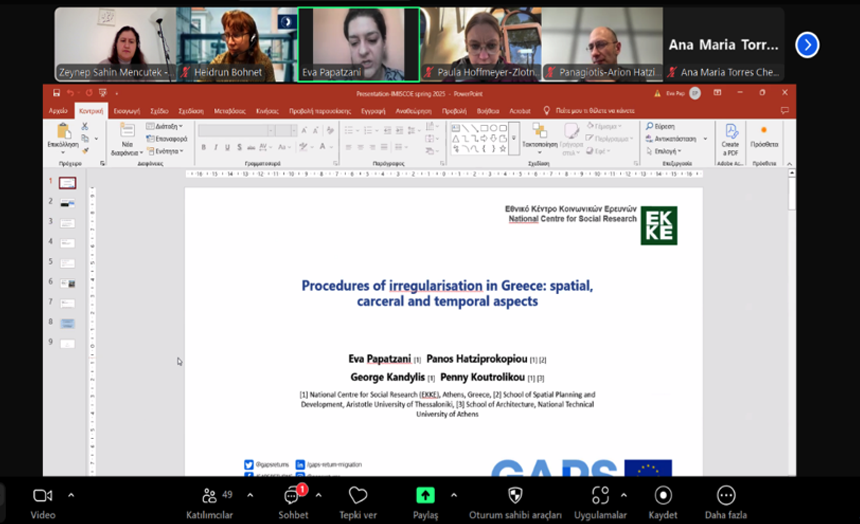GAPs Panels at the 2025 IMISCOE Spring Conference in Krems, Austria
At the 2025 IMISCOE Spring Conference in Krems, Austria, titled The Regularity of Irregularity: Rethinking Migration Paradigms, Horizon Europe project GAPs organized and participated (jointly with FAiR, another Horizon Europe project) panels that critically examined return policies, migration governance, and migrant agency.
Panel 1: Critically Assessing the Negotiation and Implementation of the EU’s Return and Readmission Policy Infrastructure
The first panel, chaired by Zeynep Mencütek, coordinator of the GAPs project and member of BICC, focused on the complex drivers and outcomes of return policies and cooperation frameworks. With over 50 attendees, panelists presented their latest research on the EU’s mechanisms for managing the return of irregular migrants, emphasizing the conditions for cooperation with third countries.
From FAIR project, Sandra Lavenex and Frowin Rausis introduced a typology of intergovernmental return/readmission cooperation frameworks (IRFs), distinguishing between regulatory and organizational dimensions. Ana Maria Torres Chedraui and Arjen Leerkes highlighted the importance of enhancing the legitimacy of return and readmission agreements by involving a broader range of stakeholders, including governments, NGOs, and civil society, and improving transparency, accountability, and adherence to international legal standards. Additionally, Paula Hoffmeyer-Zlotnik and Philipp Stutz analyzed the evolution of EU return policy norms from 1972 to 2023 using text-as-data methods.
From the GAPs project, Gerasimos Tsourapas, Samet Apaydın, and Zeynep Şahin Mencütek presented their research on “return diplomacy,” which applies Qualitative Comparative Analysis (QCA) to identify conditions leading to return agreements. Additionally, GAPs consortium members from EKKE—Eva Papatzani, Panos Hatziprokopiou, George Kandylis, and Penny Koutrolikou—examined how irregularization unfolds through various stages, from registration to reception and return policies, highlighting its spatial, temporal, and carceral effects on migrants.
The panel’s discussions provided more profound insights into how return policies contribute to the irregularization of migration, the externalization of migration management through informal agreements and conditionality, and the power dynamics, legitimacy, and intergovernmental cooperation that shape these policies.
Panel 2: Irregularized migrants’ engagement with return governance: aspirations, narratives and discourses
The second panel featured GAPs team members presenting two papers that explored migrant agency and governance frameworks in return migration.
Susan Beth Rottmann and Maissam Nimer presented their joint paper, Trapped, Aspiring, Reluctant or Precarious? Seeing Agency in Migrant Trajectories in Turkey and Morocco. Drawing on 74 migrant narratives, they argued that migrant agency is dynamic and fluctuates over time as individuals navigate legal precarity, social networks, and structural constraints. By identifying four trajectories—Trapped Aspirants, Reluctant Settlers, Precarious Survivors, and Aspiring Integrators—they demonstrated how agency emerges, recedes, and transforms in transit contexts. Theoretically, their paper integrates social navigation and the aspiration-ability framework to provide a more nuanced understanding of migrant agency in transit.
Another GAPs team member, Soner Barthoma, coordinator of the GAPs project, examined the Swedish government’s policy initiatives aimed at engaging with migrant-led organizations to promote voluntary returns, analyzing how these organizations adopt differing approaches to state return policies.
The panel also featured two additional papers presented by members of the FAiR project, contributing to a broader discussion on the governance and implications of return migration.
These two panels at the IMISCOE Spring Conference underscored the importance of critically analyzing migration governance, return policies, and migrant agency, offering valuable contributions to contemporary debates on irregular migration and return dynamics.
Contact: gaps.return.migration@gmail.com

